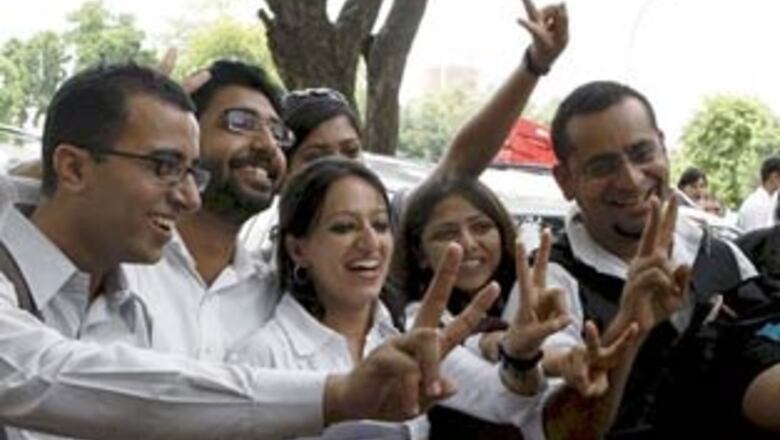
views
New Delhi: The Delhi High Court ruled on Thursday that gay sex among consenting adults was no crime, a landmark event that triggered celebrations by gay activists but which leaders of all major religions in the country denounced in unison.
In a courtroom packed with around 100 people, half of them activists, Chief Justice Ajit Prakash Shah and Justice S. Muralidhar sought changes in section 377 of the Indian Penal Code (IPC), saying it violated article 21 of India's constitution promising all citizens equality before law.
Section 377, a relic of the British Raj, relates to "unnatural offences" and says that "whoever voluntarily has carnal intercourse against the order of nature with any man, woman or animal should be punished".
"Equality and inclusiveness are the tenets of the constitution," the judges quoted India's first prime minister as saying. Calling any discrimination anti-thesis of the right to equality, they added: "Equality should not be read literally, but in true spirit."
In a 105-page judgement, the judges said that section 377 should be amended and any sex between consenting adults must be legalised. This must not apply to those under 18 years.
"We declare section 377, insofar as it criminalises consensual sexual acts of adults in private, is violative of articles 14, 21 and 15 of the constitution," the two judges said, adding their judgement would hold till parliament chose to amend the law.
The court's ruling, which followed eight years of legal battle by a determined gay community, came in response to a petition by Naz Foundation -- an NGO.
Once the order was passed, many gay rights workers from India and abroad broke into tears in the court while others shouted in joy before realising that their action would amount to contempt of court.
They quickly trooped out screaming "We have won, we have won!" and "Justice has prevailed".
Outside, boisterous gay activists hugged one another and burst into noisy celebrations, which were later extended to the Jantar Mantar observatory complex in the heart of the national capital.
Some hand-written placards held by them read: "Loving is not a crime." Another read: "377, Quit India". Gay activists in Nepal echoed the sentiments of their counterparts in India.
Anjali Gopalan of Naz Foundation said: "It is celebration time for us. We have waited for years for this day."
The reaction from Hindu, Muslim and Christian leaders was swift and bordered on anger and disbelief, with some threatening mass protests if parliament legalised gay sex. Gay activists, however, voiced confidence that the government would do that in the wake of the court edict.
Quick to hit out at the ruling was the All India Muslim Personal Law Board, whose Kamal Farooqi said: "This is a sad day for civilised society and it is not acceptable (to us)."
Yoga guru Ramdev threatened to lead mass protests if homosexuality was legalised. "(Gay sex) is against our Vedic culture."
Father Dominic Emmanuel said: "We are against legalising it ... because what they do is unnatural and against the design and will of God."
Actor and gay activist Celina Jaitley told reporters in Mumbai: "Homosexuality is now legal in India. Our long battle has been won and the gay can walk with their heads held high."
The National AIDS Control Organisation (NACO), the apex body to monitor and check HIV/AIDS in India and which was in favour of the decriminilsing gay sex, also welcomed the court decision.
"It is a positive judgment. Decriminalising this high-risk group has made our job easier as we will be able to reach them," K. Sujatha Rao, the NACO director general and secretary in the health ministry, told IANS.
According to one official estimate, there are around 2.5 million males who indulge in gay sex.
Homosexuality is legal in 150 countries including South Africa, China, Nepal, Australia, Canada and Argentina. It is illegal in many others such as Pakistan, Afghanistan, Iran and the United Arab Emirates.
The court ruling divided India's political class, with the Communists coming out in its favour and the Samajwadi Party and the Bharatiya Janata Party (BJP) opposing it.


















Comments
0 comment